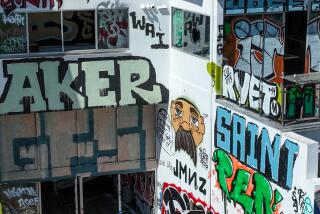‘Swastika’ Designs Anger JDL Chief : Glendale: Officials say markings weren’t meant as Nazi symbols, but removal from lampposts is demanded.
- Share via
GLENDALE — The leader of a Jewish rights group demanded Tuesday that the city remove swastika-like designs from more than 500 street lights installed in the 1920s that city leaders say were never intended to be seen as Nazi symbols.
“The swastika is an insult to the memory of millions of people who suffered at the hands of the Nazis,” said Irv Rubin, national chairman of the Jewish Defense League, threatening to sue the city if the symbols are not removed.
Rubin spoke for about 10 minutes Tuesday night to a meeting of the Glendale City Council, which said it would consider his protest.
The controversial symbols are depicted in a chain about two inches high circling the base of cast iron lampposts, and are a reverse image of the swastika used by the Nazis. City officials say that they were present on many lampposts bought by Southern California cities 70 years ago, when they were regarded as Asian emblems of good fortune.
Located in the downtown area and some of the city’s older neighborhoods, the light poles were made between 1924 and 1926. Germany’s National Socialist Party began using the symbol as early as 1919, but Americans did not associate it with anti-Semitism until Hitler came to power in the 1930s.
Swastika-like symbols have been used by various cultures for centuries, including Buddhists and Native Americans, before they became the emblem of the Third Reich and the Holocaust in which 6 million Jews died at the hands of the Nazis.
“I don’t buy this insane logic that these twisted crosses are ancient Eastern good luck religious symbols,” said Rubin, who initially brought the matter to the attention of city officials last week. “It is an insult to Americans of all religious and political persuasions.”
City officials conceded that they receive about two or three inquiries a year about the offending symbols. They said they are considering Rubin’s demand and may opt to grind them off the posts.
But City Atty. Scott Howard called it “ridiculous” for Rubin to threaten a lawsuit less than a week after raising the issue.
“If Mr. Rubin feels these symbols, which are not Nazi swastikas, are the basis for legal action, then I think he should also consider those other cities that have the same symbol on their lampposts,” Howard said.
“At the same time, we’re looking into it. We’re listening to what he says. But to expect us to wipe out 70 years of history in six days is ludicrous.”
Glendale Jewish leaders declined to back Rubin, saying the swastikas have caused no alarm in the city’s Jewish community.
Roni Blau, director of the San Fernando Valley office of the Anti-Defamation League, said her office also receives periodic inquiries about Glendale’s lampposts, as well as those of other cities. Arcadia, Beverly Hills, Los Angeles and other cities are known to have, or have had, street lights with similar insignias, she said.
“These are designs that can be found all over the county,” Blau said. “With most people, we explain to them what it really is and it becomes a non-issue.”
Rabbi Carole Meyers of Temple Sinai, Glendale’s only synagogue, described the swastikas as “innocuous.”
“I’ve walked by these lampposts many times, and you really have to be looking for the swastikas in order to notice them,” Meyers said. “They are the last on a list of priorities this city has for dealing with issues of tolerance.”
During the 1960s Glendale was home to the West Coast headquarters of the American Nazi Party. City officials say Glendale leaders succeeded in persuading the Nazis to leave.
In 1993, city leaders formed a community relations task force to help mend fences between Glendale’s Anglos, Armenians, Asians, Latinos and other ethnic groups.
Councilwoman Eileen Givens, who formed the task force, said the lamppost swastikas have never been discussed by the group. But she concurred with Howard that the council would consider “all options” on the matter.
More to Read
Sign up for Essential California
The most important California stories and recommendations in your inbox every morning.
You may occasionally receive promotional content from the Los Angeles Times.













